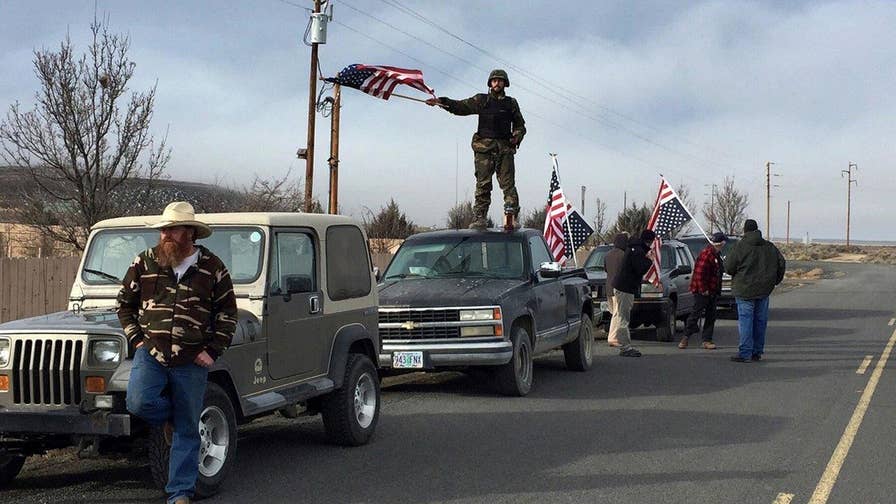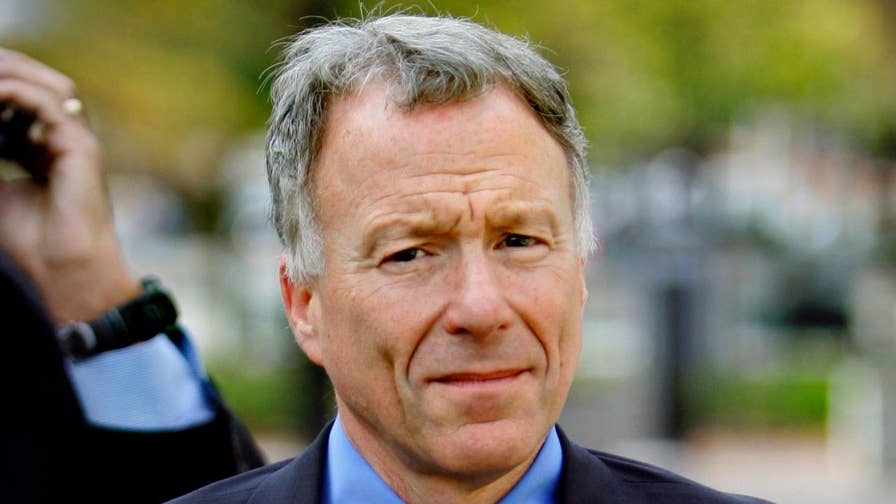United States News
See other United States News Articles
Title: Trump pardons ranchers whose arrests led to armed occupation of wildlife refuge
Source:
FOX News
URL Source: http://www.foxnews.com/politics/201 ... ccupation-wildlife-refuge.html
Published: Jul 10, 2018
Author: Andrew O'Reilly
Post Date: 2018-07-10 14:15:57 by Deckard
Keywords: None
Views: 1067
Comments: 6
President Trump on Tuesday pardoned the father and son ranchers from Oregon whose imprisonment for setting fires on federal land sparked a 41-day takeover of a wildlife refuge in the state. Trump signed the order granting clemency to 76-year-old Dwight Hammond and his son, Steven Hammond, 49, who were convicted of arson in 2012 for fires that burned on federal land in 2001 and 2006. Though they served their original sentences for the conviction -- Dwight serving three months, Steven serving one year -- an appellate judge ruled in 2015 that the terms were too short under federal minimum sentencing laws and the Hammonds were resentenced to serve the mandatory minimum. This decision led to the 2016 protests. Dwight Hammond and his son, Steven Hammond, were convicted of arson in 2012. “The Hammonds are multi-generation cattle ranchers in Oregon imprisoned in connection with a fire that leaked onto a small portion of neighboring public grazing land,” the White House said in a statement. “The evidence at trial regarding the Hammonds’ responsibility for the fire was conflicting, and the jury acquitted them on most of the charges.” The statement added: “Justice is overdue for Dwight and Steven Hammond, both of whom are entirely deserving of these Grants of Executive Clemency.” Dwight has so far served about three years in prison and Steven has served about four years. They have also paid $400,000 to the United States to settle a related civil suit. The resentencing sparked a protest from Ammon Bundy and dozens of others, who occupied the Malheur National Wildlife Refuge near the Hammond ranch in southeastern Oregon from Jan. 2 to Feb. 11, 2016. The armed occupiers changed the refuge's name to the Harney County Resource Center, reflecting their belief that the federal government has only a very limited right to own property within a state's borders. During the standoff at the refuge, FBI Agent W. Joseph Astarita allegedly shot rancher Robert "LaVoy" Finicum when officers arrested leaders of the occupation. Astarita was later accused of falsely denying he fired two shots at Finicum or his truck and pleaded not guilty to three counts of making a false statement and two counts of obstruction of justice. This is the latest in a series of Trump pardons. Back in April, Trump pardoned Scooter Libby, the former aide to Vice President Dick Cheney who was ensnared in what was known as the “Valerie Plame affair” during the Bush administration. “I don’t know Mr. Libby,” Trump said in a statement. “But for years I have heard that he has been treated unfairly. Hopefully, this full pardon will help rectify a very sad portion of his life." Trump recently pardoned a former Navy sailor after he served a year in federal prison for taking photos of classified sections of his submarine and, in May, he pardoned conservative filmmaker Dinesh D’Souza, who was convicted of making an illegal campaign contribution in 2014. In June, Trump also granted clemency to Alice Marie Johnson, who was convicted in 1996 on eight criminal counts related to a Memphis-based cocaine trafficking operation. Her involvement with cocaine dealers reportedly came about after she lost her job, her son was killed, she got divorced and her home was foreclosed on. Critics say the president could be ignoring valid claims for clemency as he works outside the typical pardon process, focusing on cases brought to his attention by friends, famous people and conservative media pundits. Aides say that Trump has been especially drawn to cases in which he believes the prosecution may have been politically motivated — a situation that may remind him of his own position at the center of the ongoing special counsel investigation into Russian election meddling. Many have also seen the president as sending a signal with his pardons to former aides and associates caught up in the probe, or lashing out at enemies like former FBI Director James Comey, who oversaw the prosecution of lifestyle guru Martha Stewart, whom Trump has said he is thinking of pardoning.



Post Comment Private Reply Ignore Thread
Top • Page Up • Full Thread • Page Down • Bottom/Latest
#1. To: Deckard, Gatlin (#0)
(Edited)
Tater will fly into a rage because the almighty judge's sentence was rendered null and void. Burn baby, burn!
First of all, a presidential pardon doesn't render a “judge’s sentence null and void” or make someone innocent of a crime, and it doesn't wipe the crime off the books entirely. What a pardon does do is restore the civil rights that most offenders lose after they're convicted of crimes. After they've been released from prison, most ex- felons don't have the right to vote; they can't run for office, own guns, or serve on juries; they can generally be discriminated against in employment; and they're subject to a host of extra restrictions that keep them from getting occupational licenses. Ex-offenders who are pardoned get those rights back. Secondly, I agree with the pardon and I believe the verdict for Dwight and Steven Hammond was wrong and the resentencing was a gross miscarriage of justice. Burning grazing land is a common practice and that the fire accidentally got onto federal land was an accident for which there should never have received a jail sentence. If there was damages, and I don’t know if there was or was not, then they should have been ordered to pay for the damage. Why didn’t you just ask me how I felt about the case instead of making such a grossly false supposition?
If a person is actually booked (printed and submitted) then nothing that happens after that arrest/booking will remove the arrest from your criminal history. When I run histories, I see sealed shit, juvenile shit and cases where there is no court disposition (charges rescinded) and cases where a not guilty verdict. Nothing ever leaves your criminal history after it’s been filed from booking.
I'm the infidel... Allah warned you about. كافر المسلح
Thank you Father, for raising up a man to defeat Hillary, and drive the corrupt totally bonkers. I am so happy for the Hammonds.
THIS IS A TAG LINE...Exercising rights is only radical to two people, Tyrants and Slaves. Which are YOU? Our ignorance has driven us into slavery and we do not recognize it.
Is your post directed towards God because of Trump's intersession?
It is, as all glory belongs to him. I think this is a glorious event.
THIS IS A TAG LINE...Exercising rights is only radical to two people, Tyrants and Slaves. Which are YOU? Our ignorance has driven us into slavery and we do not recognize it.
Thank you President Trump
#2. To: hondo68 (#1)
-
Tater will fly into a rage because the almighty judge's sentence was rendered null and void.
You are wrong on two counts. Burn baby, burn!
You may now use a fire extinguisher before you hurt yourself.
#3. To: Gatlin (#2)
and it doesn't wipe the crime off the books entirely.
#4. To: Deckard (#0)
#5. To: jeremiad (#4)
Thank you Father, for raising up a man to defeat Hillary, and drive the corrupt totally bonkers. I am so happy for the Hammonds.
#6. To: buckeroo (#5)
Top • Page Up • Full Thread • Page Down • Bottom/Latest
[Home] [Headlines] [Latest Articles] [Latest Comments] [Post] [Mail] [Sign-in] [Setup] [Help] [Register]
